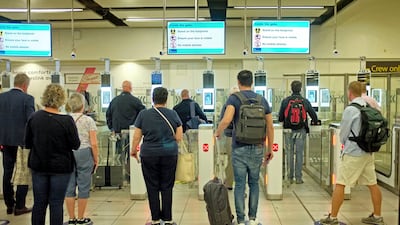EU expatriates in Britain now earn less than migrants from the rest of the world as highly qualified Europeans “stay away” after Brexit, research has found.
A report by Oxford University’s Migration Observatory says some EU migrants are entering the workforce at “significantly lower” wages than before the coronavirus pandemic.
Workers from outside the EU have overtaken them on the pay scale since the Brexit referendum of 2016.
The findings cast doubt on whether the UK has succeeded in replacing mass EU migration with a focus on skilled workers, a defining goal of the campaign for Brexit.
Yash Dubal, the director of AY&J Solicitors which focuses on immigration, told The National that there was a “high likelihood” that “skilled, high-qualified EU workers are staying away since Brexit”.
“These individuals might be finding similar or even better opportunities within the EU, without the need to navigate the complexities of UK visa processes,” he said.
“High-skilled workers are in demand across the EU, and if similar roles are available in countries like Germany, France or Italy, they might prefer those options over the UK.”
EU migrants leapfrogged
In 2016, EU migrants typically earned £1,452 per month in their first full year of employment, compared with £1,325 for non-EU citizens.
By 2022, the pattern had reversed with new non-EU workers taking home £2,098 a month and EU citizens on £1,936, according to the Migration Observatory’s figures.
The report’s authors said non-EU workers “are now entering the workforce somewhat higher up the pay distribution” while people from the EU start lower than before.
The figures may “result in part from lower migration of highly skilled EU workers who previously came to the UK under free movement rules. After all, visa grants to EU citizens have been surprisingly low”, they wrote.
“Does this mean that the post-Brexit immigration system has failed to attract a higher skills profile of new EU migrants, as it was intended to do? It is probably too early to say.”

They said the workforce was also shaken up by EU citizens moving away during the pandemic, and refugee flows from Hong Kong and Ukraine boosting the number of non-EU workers.
Britain brought in a points-based immigration system after cutting its last ties with Brussels in 2021, which applies equally to EU and non-EU citizens.
People can score points for having job offers at a required skill level, speaking good English and having a doctorate, or working in an area of particular labour shortages.
Additions to the list of skilled occupations have boosted the number of migrants and few claims are rejected because the system is “not overly complicated”, Mr Dubal said.
“Given the current human resource crisis across various UK industries, this has led to a rise in applications for the skilled worker visa from non-EU countries,” he said.
The Migration Observatory data, which is based on tax and earnings figures from the UK government, also showed that non-EU workers who start on relatively low pay are working their way up more quickly.
Non-EU migrants who entered the labour market in 2015 took about six years to reach the UK’s median wage, whereas the 2019 cohort got there after just two years, researchers said.
This suggests that “more recent non-EU arrivals, as well as earning more immediately on arrival, are also seeing strong earnings growth relative to the overall workforce”, they said.


